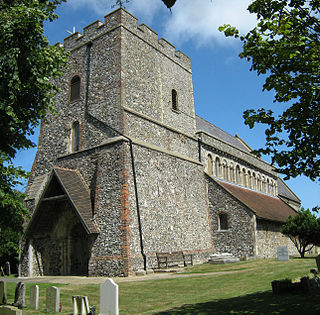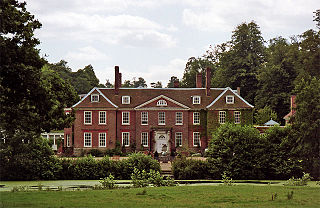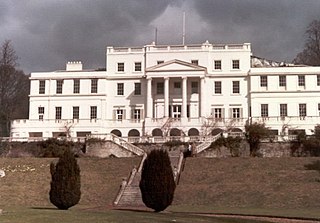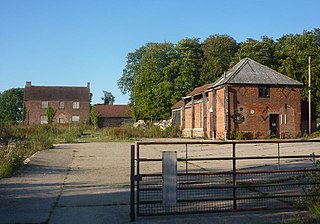
Little Missenden is a village and civil parish on the River Misbourne in Buckinghamshire, England. It is in the Chiltern Hills, about 3 miles (5 km) southeast of Great Missenden and 3 miles (5 km) west of Amersham. The village lies on the River Misbourne in the Misbourne valley.

Merton is a village and civil parish near the River Ray, about 4 miles (6.4 km) south of Bicester in Oxfordshire, England. The 2011 Census recorded the parish's population as 424.

Okeover Hall is a privately owned Grade II* listed country house in Okeover, Staffordshire, England. It is the family seat of the Okeover family, who have been in residence since the reign of William Rufus. The house lies close to the border between Staffordshire and Derbyshire, which lies on the far side of the small River Dove. The Hall is not open to the public.

St. Margaret's at Cliffe is a three-part village situated just off the coast road between Deal and Dover in Kent, England. The centre of the village is about ¾ mile (1 km) from the sea, with the residential area of Nelson Park further inland, and St Margaret's Bay situated along and below the cliffs north of South Foreland. The parish church, dedicated to St Margaret of Antioch, is a Grade I listed building.

Otham is a village and civil parish in the Maidstone district of Kent, England. The population of the civil parish at the 2011 census was 523, with 204 dwellings.

Icomb Place is a medieval manor house on the edge of the village of Icomb, near Stow on the Wold in Gloucestershire. The word "place" in this context is thought to be a precursor of "palace".

Stoneacre is a small National Trust property in Otham, near Maidstone, Kent in southern England. The property is a half-timbered yeoman farmer's house dating from the 15th century, together with a small garden, orchard and meadows. The house is a Grade II* listed building.
Little Sodbury Manor is a 15th-century manor house in Little Sodbury, Gloucestershire, England. It is a Grade I listed building.

Croxall Hall is a restored and extended 16th century manor house situated in the small village of Croxall, Staffordshire. It is a Grade II* listed building.

Hangleton Manor Inn, the adjoining Old Manor House and associated buildings form a bar and restaurant complex in Hangleton, an ancient village which is part of the English city of Brighton and Hove. The manor house is the oldest secular building in the Hove part of the city; some 15th-century features remain, and there has been little change since the High Sheriff of Sussex rebuilt it in the mid-16th century. Local folklore asserts that a 17th-century dovecote in the grounds has been haunted since a monk placed a curse on it. The buildings that comprise the inn were acquired by Hangleton Manor Ltd in 1968, and converted to an inn under the Whitbread banner. The brewery company Hall & Woodhouse have owned and operated it since 2005. English Heritage has listed the complex at Grade II* for its architectural and historical importance, and the dovecote is listed separately at Grade II.

Chilston Park is a country house in Boughton Malherbe, Kent, England. Started in the 15th century, the house has been modified many times and is a Grade I listed building, currently operated as a country house hotel.

Boughton Monchelsea Place, previously Boughton Court, is a 16th-century country house in Boughton Monchelsea, Kent, England. The first part of the house was built by Robert Rudston circa 1567–75 on the site of an earlier manor house. It has been modified a number of times during its history achieving its present form in 1819. It has been a home to a number of members of parliament for Maidstone or for Kent, including Sir Francis Barnham, Sir Robert Barnham (1646–85) Sir Barnham Rider (1698–1728) and Thomas Rider (1805–47).

Linton Park, formerly Linton Place or Linton Hall, is a large 18th-century country house in Linton, Kent, England. Built by Robert Mann in 1730 to replace a much earlier building called 'Capell's Court', the estate passed through the ownership of several members of Mann's family before coming into the Cornwallis family. The house was enlarged to its current size in 1825.

Smiths Hall, known as West Farleigh Hall from the early 20th century until the 1990s, is an 18th-century country house in West Farleigh, Kent.
Synyards is a late 15th-century house in Otham, Kent.

Norrington Manor is a medieval manor house at Alvediston, about 11 miles (18 km) west-southwest of Salisbury, in the southern English county of Wiltshire. It is a Grade I listed building.

St Nicholas's is a parish church in Otham, Kent begun in the 12th century with additions in the next two centuries. It is a Grade I listed building.

Lawshall Hall is a Grade II* listed building, re-built in 1557, that is located in the parish of Lawshall in Suffolk. The Hall is adjacent to All Saints Church and is very close to the centre of the village.

All Saints is a parish church in Ulcombe, Kent. It was begun in the 12th century and is a Grade I listed building.

The hall house is a type of vernacular house traditional in many parts of England, Wales, Ireland and lowland Scotland, as well as northern Europe, during the Middle Ages, centring on a hall. Usually timber-framed, some high status examples were built in stone.



















